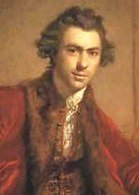In 1754, Charlotte was visited by the printer, Samuel Whyte, and a bookseller friend, presumably H. Slater, junior, who were interested in publishing her novel, Henry Dumont. By this stage she had descended into extreme poverty.
The visit made a deep enough impression on Whyte that he wrote it up in an article for The Monthly Review, 1760:
The first object that presented itself was a dresser - clean, it must be confessed, and furnished with three or four coarse delft plates, two brown platters and underneath an earthen pipkin, and a black pitcher with a snip out of it.
To the right we perceived and bowed to the mistress of the mansion, sitting on a maimed chair under the mantelpiece, by a fire merely sufficient to put us in mind of starving. On one hob sat a monkey, which by way of welcome chattered at our going in. On the other a tabby cat of melancholy aspect. At our author’s feet, on the flounce of her dingy petticoat, reclined a dog, almost a skeleton! He raised his shagged head and eagerly staring with his bleared eyes, saluted us with a snarl.
"Have done, Fidele, these are friends!" The tone of her voice was not harsh, it had something in it humbled and disconsolate; a mingled effort of authority and pleasure. Poor soul! Few were her visitors of that description. No wonder the creature barked!
A magpie perched on the top ring of her chair, not an uncomely ornament, and on her lap was placed a mutilated pair of bellows - the pipe was gone, an advantage in their present office. They served as a succedaneum for a writing desk, on which lay displaced her hopes and treasure, the manuscript of her novel Henry Dumont. Her inkstand was a broken teacup, the pen worn to a stump - she had but one! A rough deal board, with three hobbling supporters, was brought for our convenience, on which, without further ceremony, we contrived to sit down and enter upon business.
The work was read, remarks made, alterations agreed to, and thirty guineas demanded for the copy.
8 Jan 2007
Subscribe to:
Post Comments (Atom)


No comments:
Post a Comment